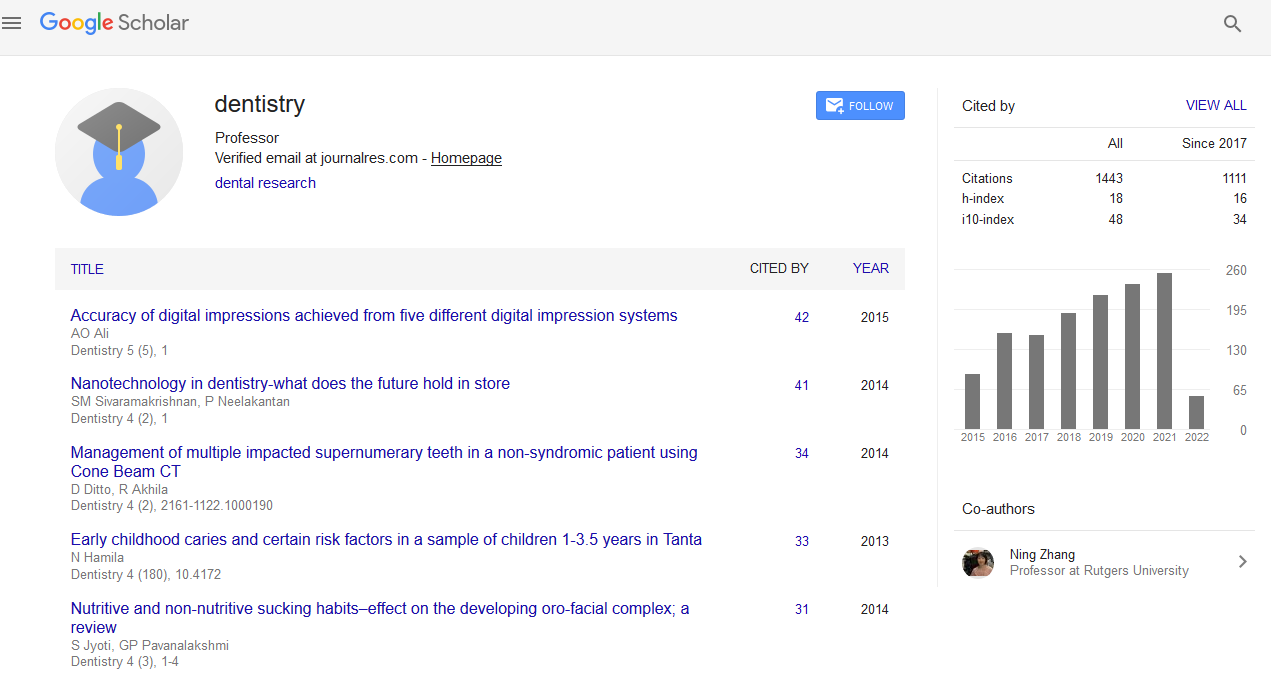Citations : 1817
Dentistry received 1817 citations as per Google Scholar report
Indexed In
- Genamics JournalSeek
- JournalTOCs
- CiteFactor
- Ulrich's Periodicals Directory
- RefSeek
- Hamdard University
- EBSCO A-Z
- Directory of Abstract Indexing for Journals
- OCLC- WorldCat
- Publons
- Geneva Foundation for Medical Education and Research
- Euro Pub
- Google Scholar
Useful Links
Share This Page
Journal Flyer

Open Access Journals
- Agri and Aquaculture
- Biochemistry
- Bioinformatics & Systems Biology
- Business & Management
- Chemistry
- Clinical Sciences
- Engineering
- Food & Nutrition
- General Science
- Genetics & Molecular Biology
- Immunology & Microbiology
- Medical Sciences
- Neuroscience & Psychology
- Nursing & Health Care
- Pharmaceutical Sciences
The effect of xylitol on dental caries and oral flora
30th International Conference on Dental Science & Advanced Dentistry
May 22-23, 2017 Las Vegas, USA
Sara Abdulrahman Alfawaz
Al-Farabi College for Dentistry and Nursing, Riyadh, Saudi Arabia
Posters & Accepted Abstracts: Dentistry
Abstract:
Dental caries, the most chronic disease affecting mankind, has been in the limelight with regard to its prevention and treatment. Professional clinical management of caries has been very successful in cases of different severities of disease manifestations. However, tertiary management of this disease has been gaining attention, with numerous methods and agents emerging on a daily basis. Higher intake of nutritive sweeteners can result in higher energy intake and lower diet quality and thereby predispose an individual to conditions like obesity, cardiovascular disorders, and type 2 diabetes mellitus. Non-nutritive sweeteners have gained popularity as they are sweeter and are required in substantially lesser quantities. Xylitol, a naturally occurring five-carbon sugar polyol, is a white crystalline carbohydrate known since a century ago. It has been widely studied during the last 40 years for its effect on dental caries. It is found naturally in fruit, vegetables, and berries and is artificially manufactured from xylan-rich plant materials such as birch and Beachwood. Since a study conducted in Turku, Finland, evaluating the effectiveness of xylitol on dental plaque reduction in 1970, xylitol has been widely researched and globally accepted as a natural sweetener approved by the US Food and Drug Administration (FDA) and the American Academy of Pediatric dentistry. This paper throws light on the role and effects of various forms of xylitol on dental caries and oral hygiene status of an individual.
Biography :
Email: dr.saralfawaz@gmail.com


